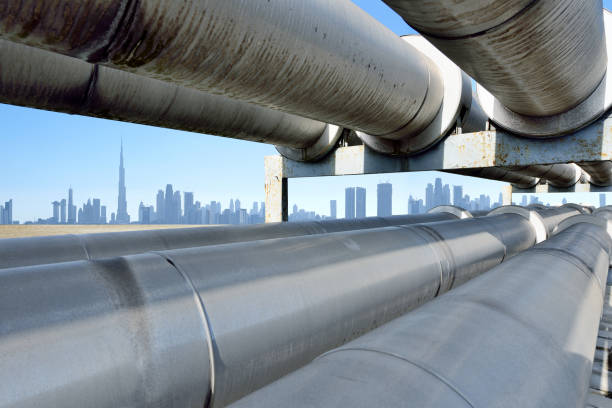Electric Resistance Welded (ERW) pipes are widely used in various industries, including construction, oil and gas, water distribution, and infrastructure development. These pipes are manufactured through a process that involves cold-forming steel coils into cylindrical shapes, followed by welding the edges using electrical resistance. ERW pipes offer high strength, durability, and cost-effectiveness, making them a preferred choice for multiple applications.
In the UAE, the demand for ERW pipes continues to grow due to the rapid expansion of industrial and construction projects. The country’s strategic location and booming infrastructure sector make it a hub for high-quality steel pipe suppliers. Businesses in industries such as petroleum, water supply, and structural engineering frequently rely on ERW pipe suppliers in the UAE to meet their project needs.
How ERW Pipes Are Manufactured
1. Raw Material Selection
Manufacturers use high-quality steel coils as the primary raw material for ERW pipes. The selection of the right steel grade ensures the final product meets industry standards.
2. Cold Forming Process
The steel strip is passed through a series of rollers, shaping it into a cylindrical form without using heat. This ensures uniformity in thickness and diameter.
3. Electric Resistance Welding
Once the edges align, high-frequency electrical current generates heat at the seam, fusing the edges together. This welding technique eliminates the need for additional filler materials, maintaining the pipe’s integrity.
4. Sizing and Cutting
After welding, the pipes are cut to the required length. Precision cutting ensures uniform dimensions, which are crucial for seamless assembly in various applications.
5. Quality Inspection and Testing
ERW pipes undergo rigorous testing, including ultrasonic testing, hydrostatic pressure testing, and dimensional checks. These tests ensure the pipes meet safety and durability standards.
Key Applications of ERW Pipes in the UAE
ERW pipes are essential in various industries due to their versatility and strength. Here are some key applications:
1. Oil and Gas Industry
The UAE is a leading oil producer, and ERW pipes play a crucial role in transporting petroleum products. They are used in onshore and offshore projects, ensuring the efficient movement of oil and gas.
2. Water Distribution Systems
Municipalities and private developers in the UAE use ERW pipes for water supply networks. These pipes offer excellent corrosion resistance, making them suitable for long-term water transportation.
3. Construction and Infrastructure
Structural engineers and construction companies rely on ERW pipes for building frameworks, bridges, and highways. Their high tensile strength makes them ideal for load-bearing structures.
4. Mechanical and Engineering Industries
ERW pipes are widely used in manufacturing machinery and industrial equipment. Their precision and strength make them suitable for mechanical applications.
5. Agricultural Sector
In UAE’s agricultural industry, ERW pipes are used for irrigation systems and drainage solutions. Their durability ensures efficient water flow in farms and plantations.
How to Choose the Right ERW Pipe Supplier in UAE
Selecting a reliable supplier is crucial to ensure you receive high-quality ERW pipes. Here are some key factors to consider:
1. Check Supplier’s Certifications
Reputable suppliers adhere to international standards such as ASTM, API, and ISO. Certifications indicate quality assurance and compliance with industry regulations.
2. Assess Product Range and Specifications
Ensure the supplier offers ERW pipes in different sizes, thicknesses, and coatings to match your project requirements.
3. Verify Testing and Quality Control Measures
A trustworthy supplier conducts non-destructive testing, hydrostatic testing, and visual inspections to maintain product quality.
4. Evaluate Delivery and Logistics Support
Timely delivery is essential for project completion. Choose a supplier with efficient logistics and storage capabilities.
5. Compare Pricing and Warranty Options
Competitive pricing is important, but quality should not be compromised. Some suppliers offer warranties, ensuring long-term reliability.
Future Trends in the UAE ERW Pipe Market
The UAE’s steel pipe industry is evolving with advancements in manufacturing technology. Here are some key trends shaping the market:
1. Increased Demand for High-Strength ERW Pipes
With the rise of mega infrastructure projects, high-strength ERW pipes are becoming a necessity for long-term structural integrity.
2. Sustainable and Eco-Friendly Manufacturing
Suppliers are focusing on environmentally friendly production methods, including the use of recycled materials and energy-efficient welding techniques.
3. Digitalization and Smart Quality Control
The integration of AI and automation in manufacturing enhances precision and reduces defects, ensuring consistent product quality.
4. Expansion of Offshore Oil and Gas Projects
As offshore drilling expands in the UAE, the demand for corrosion-resistant ERW pipes is expected to grow significantly.
Conclusion
ERW pipes play a vital role in the UAE’s industrial, construction, and energy sectors. Understanding the manufacturing process, applications, and selection criteria helps businesses make informed decisions when sourcing these pipes. Choosing a reliable ERW pipe supplier in the UAE ensures project efficiency, cost-effectiveness, and long-term durability. With technological advancements and market growth, the demand for high-quality ERW pipes is set to rise, making it essential for businesses to stay updated with industry trends.


